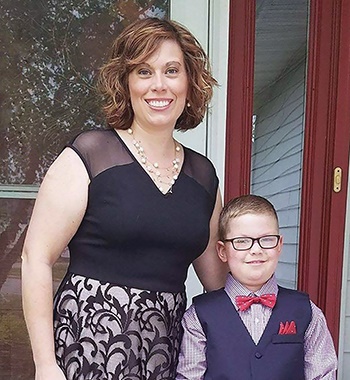Acute Lymphoblastic Leukemia Survivor
A Boy, A Battle and a T-Cell

When their otherwise healthy toddler, Austin, was diagnosed with acute lymphoblastic leukemia, Kim and Jeff Schuetz’s life turned upside down. After multiple treatments and relapses, Austin became eligible for a CAR-T cell clinical trial. He is now cancer-free. With his parents by his side, an energetic Austin kept his happy-go-lucky attitude throughout the experience, but Kim and Jeff continue to acknowledge the difficulties parents face when a child has cancer. They encourage others in a similar position to live in the now and to seek help because the battle is too tough to fight alone.
Austin and his mom, Kim, spent Mother’s Day in 2011 with grandparents while Austin’s dad, Jeff, enjoyed opening day of fishing season. When Grandpa pointed out lumps on Austin’s neck, Kim saw that they were the size of golf balls. As a registered oncology nurse, her stomach plummeted.
That Monday, Kim asked the pediatrician if it could be cancer. He looked her in the eye and said, “Kids that look this good don’t have cancer.” He diagnosed Austin with an ear infection and strep throat and prescribed antibiotics.
After a couple of days, Kim followed her gut and took Austin to a different pediatrician, who sent him to the emergency room for additional examinations. He told Kim and Jeff that he suspected Austin had leukemia. Even though she wasn’t overly religious, she asked for a chaplain to pray for Austin.
Austin was transferred immediately to a family children’s hospital about four hours away. The next morning, he had a bone marrow biopsy, and the results confirmed he had acute lymphoblastic leukemia.
A PICC line was set, and Austin began chemotherapy that day. The steroids given with chemotherapy caused his stomach to throb and gave him unrelenting nausea. They also increased his appetite, and he gained weight rapidly. Muscle pain and body aches lasted for a month, but the treatment worked.
Austin mostly stayed in good spirits throughout his treatment. He resumed pre-school and daycare. When his brown hair began to fall out, it didn’t bother him, but it was a daily reminder to Kim and Jeff that their son had cancer.
He relapsed on October 18, 2012. The only option was a bone marrow transplant. They relied on the generosity of an unnamed 51-year-old male stem cell donor. Before the transplant, hunger and exhaustion got the best of Austin. “I don’t want to go to ‘heavens’,” he said. “I want to stay with you and daddy forever.”
Just a day after the transplant, he was running through the hospital hallways playing cops and robbers. Mouth sores developed, but medications helped. He stayed in near-isolation at home for six months with hospital visits for weekly tests. As rough as it was, Kim looks back fondly on this time. Austin had many visitors, and Pet Pals brought in trained dogs to visit the kids. Austin bonded with a floppy-tongued dog named Elvis.
On day 92 after the transplantation, Austin relapsed. The doctors found a chimeric antigen receptor (CAR) T-cell therapy clinical trial in Philadelphia for pediatric and young adult patients with B-cell acute lymphoblastic leukemia. He had to be six months post-transplant, but his T-cells had to be removed immediately to protect his native cell population from the cancer. While they waited for the six months to pass, Austin rode his favorite roller coasters and visited the petting zoo. All activities came with facemasks and hand washing.
They relocated to Philadelphia for six weeks. Austin began chemotherapy. On October 1, Austin became patient #21 in the trial, and he began receiving infusions of his re-engineered T-cells. Side effects included a low-grade fever, restlessness, headaches, body aches and an upset stomach.
While they waited for the “all clear” from the hospital, they visited the Liberty Bell and the “Rocky” stairs. They attended an Eagles football game, at which Austin met another CAR-T patient in the trial (#22). The two boys stood on the field, smiles plastered across their faces, as the players rushed the field.
It was Halloween and Kim’s birthday when Kim got the call that Austin was cancer-free. He was trick-or-treating ahead of her, and she burst into tears.
Kim and Jeff encourage others to recognize the emotional aftereffects of having a young child with cancer. They acknowledge that it gets easier over time, but the worry never goes away. They recommend talking to your child’s health care team about ways to manage the stress. Heroes never fight a battle alone.


